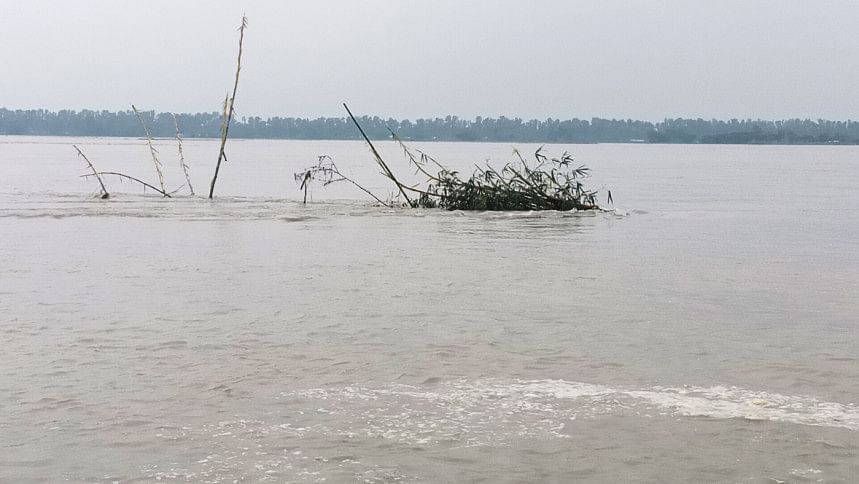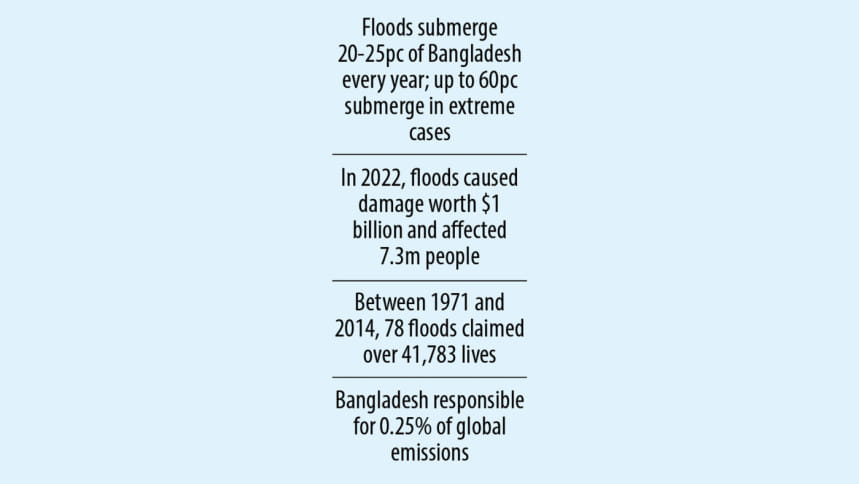Study on Climate change: Flooding may rise by 36pc

Flooding in Bangladesh is predicted to increase by up to 36 percent in the future if the global emission continues to rise.
According to a report published yesterday by Grantham Research Institute on Climate Change and the Environment and Centre for Climate Change Economics, peak river flows in the country could surge by 36 percent between 2070-2099 if the global emission continues.

Even if the emission level remains low, floods will increase by 16 percent during this time compared to 1971–2000.
Currently, floods submerge up to 20-25 percent of Bangladesh every year and extreme floods, when they happen, submerge 55-60 percent of the country.
Citing the disaster management ministry, the report says the 2022 flood in Bangladesh is estimated to have cost US$1.0 billion and affected 7.3 million people.
The report says over half of the country's population is exposed to high flood risks.
"Climate change is exacerbating this risk and causing damage with an increasingly high financial and humanitarian cost," the report mentions.
According to the report, erratic rainfall patterns, intensifying flash floods, rising sea levels, and hastening glacial melting are all contributing to the crisis. The situation demands an urgent and comprehensive response on a global scale, says the study.
It also mentioned that without greater adaptation action and resilience-building, the humanitarian and economic costs of flooding in Bangladesh, which are already high, are expected to increase further.
Between 1971 and 2014, 78 floods claimed over 41,783 lives and inflicted economic damages totaling $12.2 billion. The 2022 flood is estimated to have cost $1 billion and affected 7.3 million people, the report adds.
It says a low-carbon pathway is crucial for Bangladesh to tackle future flood crises.
Referring to the recent flood in Bandarban, the study says Bangladesh is "under siege by water" -- floods have reduced the population's ability to cope, triggering a cascade of setbacks that have long-lasting implications for their well-being and prosperity.
Prof Dr. A.K.M. Saiful Islam, director, Institute of Water and Flood Management (IWFM) of BUET, said recent events such as the devastating floods in Bandarban and Sylhet serve as stark reminders of the urgency of the situation.
"The vulnerable state of our nation demands immediate action," he added.
Bangladesh contributes just 0.25% of global greenhouse gas emissions, but its plight underscores the need for collective climate action, says the report.
The agriculture and energy sectors are responsible for most of the country's emissions, contributing 44% and 39% respectively and are estimated to peak in 2040.
The report recommends that a low-carbon pathway is crucial for Bangladesh to tackle future flood crises.
Strengthening early warning systems for flood preparedness, improving understanding of vulnerabilities and local needs, increasing capacity within local institutions, and embracing nature-based solutions are vital.
Dr Saleemul Huq, Director, International Centre for Climate Change and Development (ICCCAD) said the need for immediate action is becoming more urgent.
"All we need is global cooperation as we are facing the challenges concerning strong adaptation strategies and energy transition. It is also imperative to have adequate climate finance and take a firm stance on "loss and damage" and create a world that overcomes adversity."

 For all latest news, follow The Daily Star's Google News channel.
For all latest news, follow The Daily Star's Google News channel. 



Comments